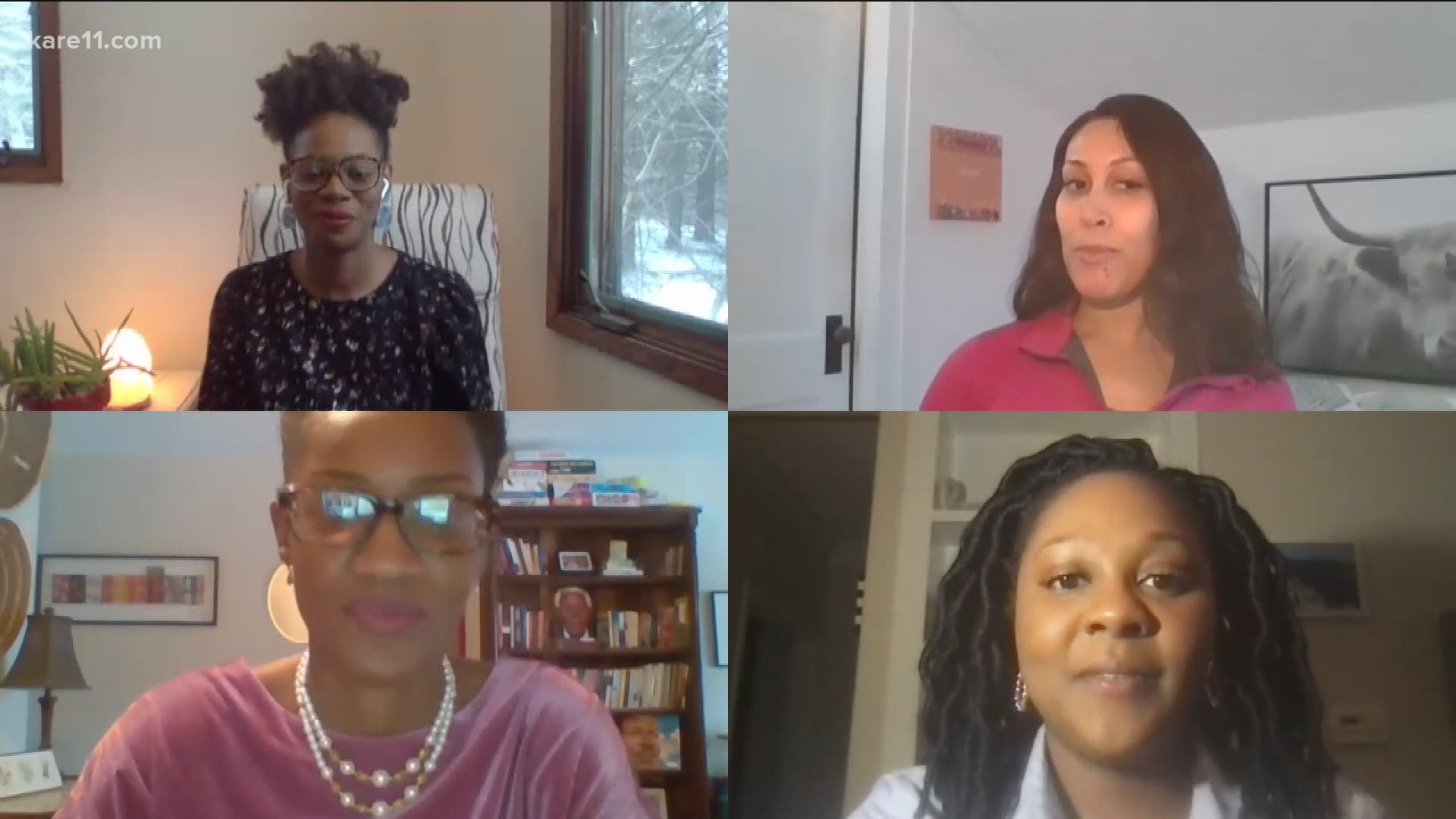MINNEAPOLIS — The "Black Minnesotans Making History" series started during Black History Month last year as a way to feature individuals who work for positive change in their communities. Considering all that has happened in Minneapolis since then, panel discussions felt more appropriate this year.
This week, the focus is mental health. Reporter Kiya Edwards spoke with
Chartel Hawkins, a licensed professional clinical counselor for Catalyst Mental Health, Kendra Shulman, a social worker for Washburn Center For Children, and Porsche Peak Gordin, a marriage and family therapist and licensed alcohol and drug counselor. Peak Gordin is also owner and executive director of Peak Behavioral Health, a mental health clinic that is located in Little Canada and St. Cloud and currently servicing clients through telehealth.
Edwards: Thank you so much for joining me. I am very excited to learn more about each of you and the ways you are making a positive difference, so if you don't mind starting things off with your role and the things you're doing to help people.
Kendra Shulman: I currently do children's mental health case management. In that role, I primarily help families access mental health services and also basic needs services in the community. I'm also advocating for kids and families, coordinating care between providers that are also involved with children across the mental health realm, and also a little bit of monitoring their progress and just supporting children and families and making positive changes in their lives and in their homes.
Porsche Peak Gordin: We primarily do outpatient mental health therapy, which means that individuals, pandemic and COVID aside, would come into our office and receive mental health care. We work with children, teens, adults, couples, families. We have group therapy as well and it's kind of cool, we have a collective of people who have a shared goal of making mental health care more accessible to marginalized groups of people.
Chartel Hawkins: I am an outpatient therapist where I see primarily teens and adults. I have some couples that come in as well. So yes, outside of pandemic times, clients come into the office to receive services but right now I'm doing sessions remotely.
Edwards: How has your practice changed in the last year?
Hawkins: I am more direct in terms of racial engagement. That's something that has changed in the aftermath of George Floyd. You know, a session where I might have just let the client use their words and kind of their framing, I'm more direct in that now. I'm like, 'Oh no. Let's call this what this is because things don't change if we don't.'
Edwards: How have mental health services changed in terms of funding, legislation, accessibility, social stigma?
Hawkins: Something that I have found in my practice is an increase in Black people wanting services.
Peak Gordin: Just a few months before that, the pandemic hit us all so when we're talking about the mental health need kind of increasing we're also looking at people who lost their jobs. People who are now trying to figure out childcare. I'm not sure that the stigma has reduced. I think right now what we're seeing is people are so desperate so they're like 'Let me try this.'
Edwards: Is there any kind of program that's kind of helping out at least right now?
Peak Gordin: Loveland Foundation is one. They will provide individuals seeking mental health services with a voucher where they'll pay either a partial amount or the full amount.
Taraji P. Henson has the Boris Foundation for mental health where she also provides free or low-cost mental health services.
Different insurance providers have allowed for telehealth services to be covered so that has been one improvement, which is pretty significant because our reach does go much further as a result of being able to see people remotely.
Edwards: What else needs to happen to help Black Minnesotans thrive?
Shulman: A lot of Black families are still not trusting of white providers. That just speaks to the point of us not having more people of color serving our community. I don't know how we can increase those numbers. I don't know if this will help recruit folks but we need more people in the mental health field that look like us.

